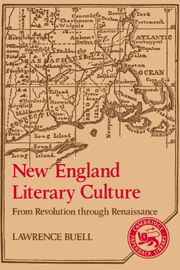Book contents
- Frontmatter
- Contents
- Acknowledgments
- Abbreviations of Frequently Cited Works
- PART I FOUR OVERVIEWS
- PART II THREE REPRESENTATIVE GENRES
- 5 New England Poetics: Emerson, Dickinson, and Others
- 6 New England Oratory from Everett to Emerson
- 7 Literary Scripturism
- PART III REINVENTING PURITANISM: THE NEW ENGLAND HISTORICAL IMAGINATION
- Part IV NEW ENGLAND AS A COUNTRY OF THE IMAGINATION: THE SPIRIT OF PLACE
- Postscript
- Appendix Vital Statistics: A Quantitative Analysis of Authorship as a Profession in New England
- Notes
- Index
5 - New England Poetics: Emerson, Dickinson, and Others
Published online by Cambridge University Press: 15 October 2009
- Frontmatter
- Contents
- Acknowledgments
- Abbreviations of Frequently Cited Works
- PART I FOUR OVERVIEWS
- PART II THREE REPRESENTATIVE GENRES
- 5 New England Poetics: Emerson, Dickinson, and Others
- 6 New England Oratory from Everett to Emerson
- 7 Literary Scripturism
- PART III REINVENTING PURITANISM: THE NEW ENGLAND HISTORICAL IMAGINATION
- Part IV NEW ENGLAND AS A COUNTRY OF THE IMAGINATION: THE SPIRIT OF PLACE
- Postscript
- Appendix Vital Statistics: A Quantitative Analysis of Authorship as a Profession in New England
- Notes
- Index
Summary
Hark! from New England's peaceful shores arise
Ten thousand lyres, whose music sweeps the skies.
“Peter Pindar, Jr.,” Parnassus in Philadelphia (1854)[Nature] appoints us to keep within the sharp boundaries of form as the condition of our strength.
Ralph Waldo Emerson, “The Superlative” (1882)Of the three major fictive genres, poetry alone was held in anything like high regard throughout our period. The writing of poems was respectable to an extent that the writing of prose fiction and stage plays definitely was not. Today it seems odd that the more mimetic genres were held suspect by an age of aesthetic utilitarianism in favor of the form now usually considered as having the least social impact. Undoubtedly, cultural inertia had much to do with this anomaly: Poetry had a traditional prestige the other genres lacked, as a polite accomplishment sanctioned by Milton, Pope, and (later) Wordsworth as an instrument of instruction and ennoblement. In any event, poetry was written throughout the American colonies from an early date and was institutionalized as a regular feature of the publishing scene well before the Revolution, whereas fiction and drama emerged much more slowly, not achieving similar legitimacy until well into the nineteenth century.
The premodern poetry of New England presents to the literary historian the paradox of an inconsequential superiority – “superiority” since by any standard American poetry between the Revolution and the centennial was dominated by New Englanders.
- Type
- Chapter
- Information
- New England Literary CultureFrom Revolution through Renaissance, pp. 105 - 136Publisher: Cambridge University PressPrint publication year: 1986



